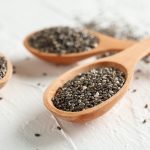Along with proteins and fats, Carbohydrates (carbs) are the principal macronutrients that are required by the body. They are called Carbohydrates because their chemical composition is Carbon, Hydrogen, and Oxygen. Your body does not manufacture macronutrients and they have to be obtained through the diet.
Carbs are the key source of energy. They provide energy for the muscular system and the nervous system. They also assist in metabolizing fats. Insufficiency of carbs in the diet leads the body to draw energy from proteins. This can weaken muscles and put pressure on the kidneys.
Your body obtains about 60% of its calorie needs through carbohydrates. Each gram of carbohydrate contains 4 calories. Carbohydrates are of two types – Starch, which is a complex carbohydrate and Sugar, which is a simple carbohydrate. Both get digested and release sugar which is then absorbed in the bloodstream. The simple carbs contain sugars in the form of fructose and galactose. They are called monosaccharides. The carbs that contain two sugars are called disaccharides and are commonly found in dairy products and vegetables. The simple carbs get absorbed fast and release sugar faster and this can lead to sugar spikes.
Starch also called complex carbs contains three or more sugars (polysaccharides) and is found in potatoes, beans, peanuts, whole bread, and cereals. They take time to get digested and hence release sugar slowly. Cereals and pulses are the main dietary sources of Carbs.
Fibre is another type of carbohydrate, found in unrefined cereals, oatmeal, nuts, fruits, and vegetables especially leafy greens, carrots, beans, peas, tomatoes, and more. The fibre moves from the stomach to the small intestine and then to the large intestine. It does not get digested, but absorbs water and swells up. This prevents the intestine from becoming dry, which in turn prevents constipation and helps promote a healthy bowel. There are two types- Soluble fibre, which can help lower blood cholesterol and blood glucose levels and Insoluble fibre, which helps maintain regular bowel movements and increases stool bulk. Unlike other Carbs, fibre does not get converted to sugar but tends to be more filling than simple sugar foods, thus aids in achieving a healthy weight. Fibre is a crucial and often neglected part of one’s diet. A high fibre diet can reduce the risk of several diseases like diverticulitis, hemorrhoids, colorectal cancer, and heart diseases.
Reviewed by- Dr. N. Nayak, MBBS, MD






